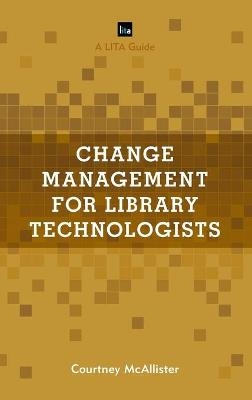
Change Management for Library Technologists
Rowman & Littlefield (Verlag)
978-1-5381-1868-9 (ISBN)
Technology has transformed how libraries, archives, and museums store and display their collections, engage with their users, and serve their communities. The pressure to implement new technologies is constant, but technology that isn’t truly useful to users, staff, and stakeholders can represent a huge investment of time and money that yields little reward. In order to make meaningful technology changes in our libraries, archives, and museums, we need a flexible toolkit that will help information professionals become change leaders, navigating the equally complex variables associated with system specs and human experience or perception. Change management incorporates these concerns into a comprehensive framework.
Change management principles form the foundation for this book’s approach to managing technology change. While change will inevitably elicit unexpected situations or complications, cultivating a change management repertoire can help information professionals better identify opportunities for valuable technology change, plan and execute those changes, assess the process, and translate the experience into enriched plans for the future. Whether you have been managing library systems for decades or are an MLIS student, this book is designed to introduce you to change management principles and practical skills that you can apply to your local organization’s needs.
Chapters on assessment, communication, and iterative change outline a wide range of skills that can facilitate changes like an ILS migration, makerspace launch, website re-design, or room reservation process overhaul. The condensed case studies integrated throughout the book demonstrate the breadth of technology changes taking place in the field and give first-hand accounts of triumphs and learning experiences. There is universal template that guarantees successful technology change. But a robust change management toolkit can cultivate organizational adaptability and responsiveness that empowers libraries, archives, and museums to make the most of current technology changes and positions them to embrace new ones.
Courtney McAllister is currently the electronic resources librarian at Yale University’s Lillian Goldman Law Library, where she oversees the lifecycle of e-resources and systems. In her previous positions at The Citadel, The Military College of South Carolina she was heavily involved with many change processes, from the launch of a makerspace to a building renovation project and subsequent library-wide reorganization of departments and services. McAllister holds a B.A. from the University of Mary Washington, an M.A. from the University of Warwick, and an M.L.I.S. from the University of South Carolina: Columbia. She has researched and presented on emerging technologies, change management, assessment culture, and systems thinking. She is the Associate Editor of The Serials Librarian.
Foreword by A. Scarlet Galvan
Acknowledgements
Preface
Introduction: Why Manage Change?
1.The Change Toolkit: Change Management, Technology, and Leadership
2.Charting the Course: Assessment and Change Action
3.The Hidden Side of Technology Change: Emotion and Engagement
4.Socializing Technology Change: Communication and Acceptance
5.Planning for the Future: Iterative Adaptation and Organizational Learning
Appendices
1.Recommended Readings and Resources for Change Management
2.Running Successful Pilots
3.Communication Tips and Tricks
Glossary
Contributors
Index
| Erscheinungsdatum | 02.09.2019 |
|---|---|
| Reihe/Serie | LITA Guides |
| Verlagsort | Lanham, MD |
| Sprache | englisch |
| Maße | 159 x 237 mm |
| Gewicht | 390 g |
| Themenwelt | Sozialwissenschaften ► Kommunikation / Medien ► Buchhandel / Bibliothekswesen |
| ISBN-10 | 1-5381-1868-8 / 1538118688 |
| ISBN-13 | 978-1-5381-1868-9 / 9781538118689 |
| Zustand | Neuware |
| Haben Sie eine Frage zum Produkt? |
aus dem Bereich


